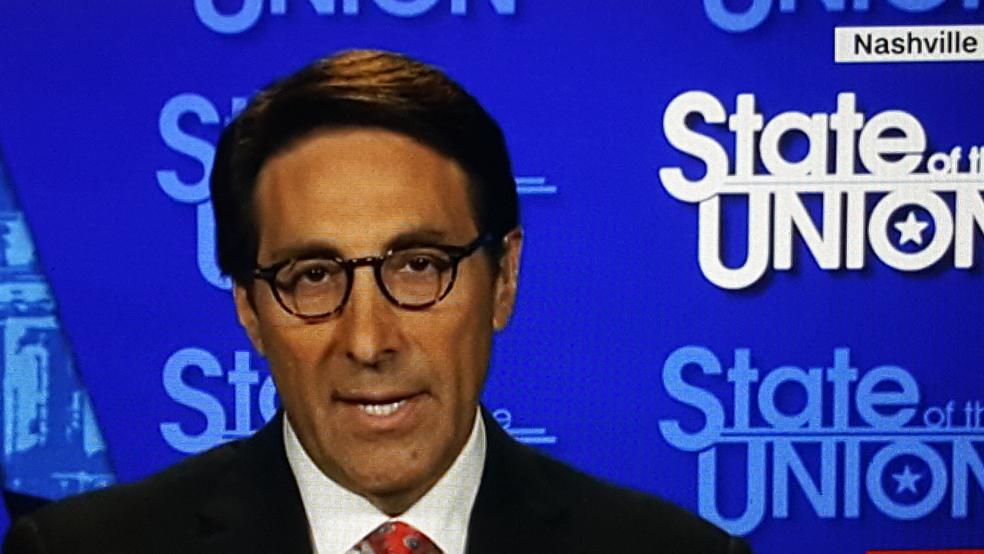One of the toughest jobs in Washington, going on two years now, has been appearing on political talk shows to defend Donald Trump’s public statements when they conflict with annoying things like objective facts, Trump’s own previous statements, or the statements of his cabinet members and White House staff. On Sunday, the short straw was drawn by attorney Jay Sekulow, a member of the personal legal team Trump has begun assembling to defend him against possible accusations of obstruction of justice in the investigation of Russian meddling in the November presidential elections.
Appearing on four of the five main Sunday shows, Sekulow had to find a way to square the White House’s preferred narrative -- the President is not personally under investigation for anything -- with Trump’s own assertion on Twitter just two days before that he is under investigation:
Related: Russia’s Top Troll Strikes Again: Putin Offers Comey Political Asylum
I am being investigated for firing the FBI Director by the man who told me to fire the FBI Director! Witch Hunt
— Donald J. Trump (@realDonaldTrump) June 16, 2017
Trump’s tweet was posted more than a day after a Washington Post story reported that “Five people briefed on the interview requests, speaking on the condition of anonymity because they were not authorized to discuss the matter publicly,” confirmed that Special Counsel Robert Mueller, appointed to look into allegations that members of the Trump administration colluded with Russia to interfere with the election, was investigating whether or not Trump had sought to obstruct justice.
The allegation arose after former FBI director James Comey testified that Trump had asked him to drop an investigation more than once into former National Security Adviser Michael Flynn. Claims also arose that Trump asked the director of the National Security Agency to declare that he was not under investigation and asked the Director of National Intelligence to tell Comey to back off the Flynn investigation.
Trump would later fire Comey, saying at first that he had done so on the recommendation of Attorney General Jeff Sessions and Deputy AG Rod Rosenstein, but later admitted that he had decided to fire Comey prior to hearing from the Justice Department and that he had done so because of his frustration about the Russia investigation.
Not surprisingly, most of the hosts interviewing Sekulow on Sunday morning started by taking the president at his word that he is “being investigated.” But the president’s attorney repeatedly and definitively declared that Trump is not, in fact, under investigation. It was a tactic that earned him incredulous pushback from his interviewers, all of whom pointed to Trump’s own tweets.
Related: Time for Trump to Face It: From Now on, Every Week Is ‘Russia Week’
Things got particularly contentious between Sekulow and Fox News Sunday host Chris Wallace, who pointed out that Sekulow simply cannot say whether the special counsel is investigating Trump.
Sekulow pointed to testimony Comey gave to the Senate Intelligence Committee, in which he declared that there was no investigation of Trump under way when he was fired. However, that argument conveniently ignores that Comey was fired more than a month ago, prior to the appointment of Mueller, and most importantly, that Comey’s firing itself could have been the reason for opening an investigation into Trump’s possible obstruction of justice.
Even Trump’s most ardent defenders don’t claim that he is a constitutional scholar -- House Speaker Paul Ryan has suggested that the bar should be lower for Trump in terms of his behavior because of his lack of expertise -- but Sekulow went on to suggest that the president’s tweet about being under investigation was trying to call attention to a question of constitutional law. Specifically, how can the president be accused of wrongdoing when he fired the FBI director, who serves at his pleasure, after receiving a recommendation that he do so from the attorney general, backed up by a memo critical of Comey written by the deputy attorney general?
Again, Sekulow left out some key points, which Wallace and others were only too happy to raise: Trump later told NBC’s Lester Holt that he had already made up his mind to fire Comey regardless of the recommendation from Sessions and that he was firing him because he was unhappy with the Russia investigation.
Related: Why Trump Is Almost Certainly Bluffing When It Comes to Comey
This will likely go on in the same vein for months, with Sekulow and others defending Trump against a very specific charge of obstruction of justice through his firing of Comey. However, it’s important to note that the future of Trump’s presidency may have little to do with whether there was a prosecutable violation of the law involved his handling of the Russia investigation.
There is real controversy over whether a sitting president can be indicted at all while in office. And while Sekulow and others, understandably, want to keep the focus on narrow legal questions, the greatest danger for Trump lies not in the realm of the courts, but in the world of politics. Regardless of whether he can be brought up on criminal charges, if evidence of obstruction piles up in public view, it could cripple his ability to press his agenda in Washington, and could ultimately lead members of Congress to consider an impeachment proceeding.





